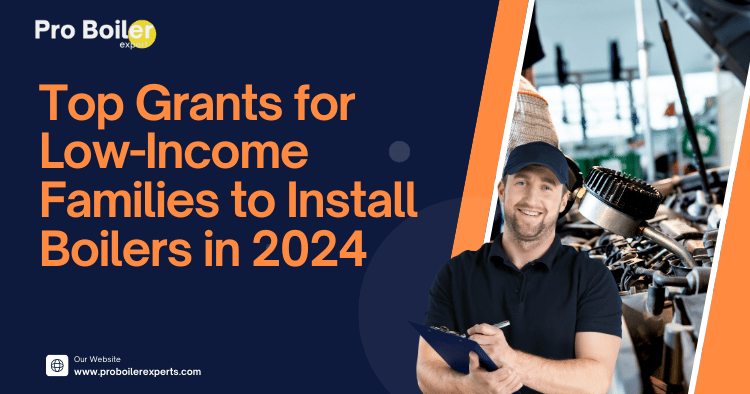Table of Contents
- Introduction
- Why Upgrading Your Boiler Matters
- Understanding Available Grants
- Top Grants for Boiler Installation
- How to Apply for These Grants
- Frequently Asked Questions
- Conclusion
Introduction
For low-income families, the dream of having a reliable heating system can often feel out of reach. With the rising costs of energy and the need for efficient home heating, many families are left struggling to keep their homes warm. Fortunately, various grants are available to assist low-income households in installing energy-efficient boilers in 2024. This article will guide you through the best options available, how to apply, and why upgrading your boiler is essential for both comfort and savings.
Why Upgrading Your Boiler Matters
Upgrading your boiler is not just about comfort; it’s also about efficiency and savings. Older boilers can be significantly less efficient, leading to higher energy bills and increased carbon footprints. Here are some reasons why upgrading is a wise choice:
- Energy Efficiency: Newer boiler models often operate at over 90% efficiency, translating to lower energy costs. For those considering options, check out the top energy-efficient boiler types for 2024.
- Safety: Older boilers can pose safety risks, including carbon monoxide leaks.
- Environmental Impact: Modern boilers emit fewer greenhouse gases, helping to combat climate change.
- Increased Property Value: An updated heating system can enhance your home’s market value.
Investing in a new boiler not only helps your wallet but also contributes to a healthier planet.
Remember, safety should always come first. Regular maintenance can prevent dangerous situations.
Understanding Available Grants
Grants are essentially funds provided by government agencies or organizations to help individuals and families with specific needs. For low-income families, these grants can make all the difference in affording an essential home upgrade like a boiler. Understanding the different types of grants available is crucial to making the most of these resources.
Types of Grants
- Federal Grants: Offered by national programs like LIHEAP and WAP.
Federal grants often have more extensive funding and can cover a larger portion of your installation costs.
- State Grants: Vary by state, often tailored to local needs.
Check with your state’s energy office to discover unique opportunities available in your area.
- Utility Company Programs: Many utility companies offer rebates or assistance for energy-efficient upgrades.
Top Grants for Boiler Installation
Here are some of the top grants available in 2024 for low-income families looking to install boilers:
1. LIHEAP (Low-Income Home Energy Assistance Program)
LIHEAP is a federally funded program that helps low-income families with their energy bills, including the costs associated with heating systems. This program can provide assistance for both energy bills and home energy-related repairs, including boiler installations.
- Eligibility: Generally, families must meet income guidelines set by the program.
- Benefits: Grants can cover part of the installation cost or even provide funds for emergency repairs.
For more information, visit LIHEAP’s official site.
2. Weatherization Assistance Program (WAP)
WAP is designed to help low-income families reduce their energy costs by improving the energy efficiency of their homes. The program provides funds for various improvements, including the installation of energy-efficient heating systems like boilers.
- Eligibility: Income must be at or below 200% of the federal poverty level.
WAP can be a game-changer, providing not only boiler installation but also insulation and sealing, enhancing your home’s overall efficiency.
- Benefits: In addition to boiler installation, WAP may cover insulation, sealing, and other energy-saving measures.
Learn more about WAP at the Department of Energy’s website.
3. State-Specific Grants
Many states have their own grant programs to assist low-income families with energy efficiency upgrades. These can range from direct financial assistance for boiler installation to tax credits for energy-efficient home improvements.
- Eligibility: Varies by state, often based on income and household size.
State grants can provide tailored solutions that fit your community’s specific needs.
- Benefits: Grants can significantly reduce the financial burden of installing a new boiler.
To find state-specific grants, check your state’s energy office website or visit Energy.gov’s state resources page.
4. Local Utility Company Programs
Many local utility companies offer programs designed to help low-income customers afford energy-efficient upgrades. These can include rebates for new boiler installations or grants specifically for low-income households.
- Eligibility: Often requires proof of income and can vary by utility provider.
Utility programs can offer quick relief and often have simplified application processes.
- Benefits: Financial assistance can come in the form of rebates or direct grants to cover boiler installation costs.
Check with your local utility provider for details on available programs.
How to Apply for These Grants
Applying for grants can seem daunting, but the process can be straightforward if you follow these steps:
- Research: Gather information about the grants available in your area. Utilize resources like Grants.gov for federal grants.
- Check Eligibility: Review the eligibility requirements for each grant to ensure you qualify.
- Gather Documents: Prepare necessary documentation, such as income statements, proof of residency, and any required forms.
- Submit Application: Follow the specific guidelines for each grant program and submit your application by the deadline.
- Follow Up: After submitting, check in to ensure your application is processed and inquire about the timeline for funding.
Taking the time to thoroughly research can open up more opportunities for assistance.
Frequently Asked Questions
1. How do I know if I qualify for these grants?
Qualifying criteria can vary by program but generally include income limits and residency requirements. Check the specific grant for detailed eligibility information.
2. Can I apply for multiple grants?
Yes! You can apply for multiple grants as long as you meet the eligibility requirements for each.
3. How long does it take to receive grant funds?
The timeline can vary widely depending on the grant program. It’s best to inquire directly with the program administrators for specific timelines.
4. Are there any costs associated with applying for these grants?
Most grant applications are free to submit, but you may incur costs for documentation or application assistance if you choose to seek help.
Conclusion
Installing a new boiler can be a significant expense, especially for low-income families. However, numerous grants can ease this financial burden in 2024. By exploring options like LIHEAP, WAP, and local utility programs, you can take vital steps towards ensuring your home is warm, safe, and energy-efficient.
Your comfort and safety are worth it! Don’t hesitate to reach out to local agencies and utility companies for assistance in navigating these resources.
Also, consider learning about the top benefits of choosing a system boiler for your home or exploring energy-efficient heating systems for your home to make informed decisions about your heating needs.





